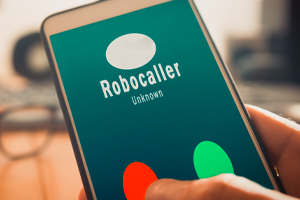There are few types of recorded messages that come to your phone that are permissible. They include messages from charities, automated political messages, flight updates, school announcements and reminders for prescriptions or medical appointments.
Illegal robocalls became even more prolific during the pandemic, preying on peoples’ fear about the virus. Some of the scams promised:
- Fake COVID-19 testing and cures
- Medical equipment, such as ventilators, to high-risk individuals
- Help with government-issued stimulus checks
- Low-priced health insurance, and
- Work-at-home schemes.
And this is a partial list, including only the scams around the COIVID-19 crisis. There are many more robocalls that promote a variety of products and services. The bottom line: If you didn’t give permission to the robocaller, hang up immediately, and definitely do not provide any information. Also, don’t trust caller ID. Scammers are able to fake the name and number that appears on your phone. Always remember that government agencies and financial institutions will never call you asking for personal information or money.
If you receive an illegal robocall, you can report it to the FTC on their FTC Complaint Assistant page.

